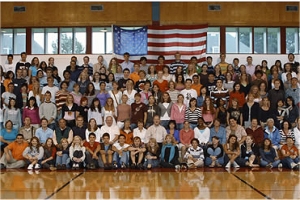Vice Versa
Only Best Foreign Students Get U.S. Scholarships, Educator Says

Educator says only best foreign students get U.S. scholarships, but U.S. colleges and universities remain desirable place to study
One of the greatest challenges for foreign students wishing to study in the United States is cost, but unless a student has excellent qualifications, proficiency in English and an original, honest and thoughtful application essay, he or she will likely not get a scholarship from a U.S. university, says educator Philip G. Altbach.
Scholarship funds are limited -- not just for international students but for U.S. students as well -- and hard to get, Altbach said in a November 7 USINFO Webchat.
Altbach is the director of Boston College’s Center for International Higher Education and professor of higher education at the college’s Lynch School of Education.
He said he agrees that the English language proficiency test -- known as TOEFL (test of English as a foreign language) -- is too expensive and often not conveniently located in some countries, but added that such a test is necessary for all students from abroad, even for short or summer courses of study.
Nearly 600,000 international students are studying in U.S. universities, and although there are students from other nations in all fields of study in the United States, the largest numbers are in business management and engineering programs, Altbach said. Most foreign students in the United States are studying at the graduate level -- for master’s or doctorate degrees, but there are some undergraduates working toward a bachelor’s degree, he added. (See related article.)
Despite the challenges to studying in the United States, the number of foreign students will continue to rise because the United States “is a destination that is desired by many in other countries,” according to Altbach.
The United States welcomes increasing numbers of international students and is working to find new opportunities for first-rate but financially disadvantaged students to attend U.S. colleges and universities, a State Department official told a congressional hearing in June.
Thomas Farrell, deputy assistant secretary for academic programs in the Bureau of Educational and Cultural Affairs, told a House of Representatives subcommittee June 29 that 78 percent of international students rely on their families and personal resources to attend schools in the United States. (See related article.)
Although the U.S. higher education system is stable and institutions tend to change slowly, Altbach said in the webchat, there have been some important changes that continue to make studying in the United States desirable for many people. For example, because universities report on the effectiveness of their various programs, they are paying greater attention to teaching and student learning outcomes.
Altbach said distance learning is a small but growing part of U.S. education that might be an alternative for foreign students unable to travel to the United States. Many universities offer online degrees, particularly in such fields as information technology and business management, he said.
But he cautioned that one needs to check the credentials of a particular provider of the distance degree program because “there is no really good monitoring of quality of such programs.” He said that distance learning programs are expanding rapidly, but “it is ‘buyer beware.’”
Altbach said students also should check that a university they wish to enroll in is an accredited institution of learning, which means a school whose standards have been certified by one of the recognized accrediting institutions. “A degree from an unaccredited university is not worth anything,” he said.
A database of accredited postsecondary institutions and programs is available on the U.S. Department of Education Web site.
More information on resources for students interested in studying in the United States is available on the State Department’s EducationUSA Web site.
A transcript of Altbachs discussion and information on previous and upcoming webchats are available on USINFOs Webchat Station.
For additional information, see the eJournal USA College and University Education in the United States.
Recently on Vice Versa
Foreign Students Enhance Global Outlook at U.S. High School
 Washington International School offers broad exposure to many cultures.
Washington International School offers broad exposure to many cultures.
International Graduate Enrollment Increases at U.S. Universities
 International graduate enrollment at U.S. universities has grown substantially, increasing 7 percent from 2006 to 2007 -- the largest gain since 2002 -- according to a new study released November 5 by the Council of Graduate Schools (CGS).
International graduate enrollment at U.S. universities has grown substantially, increasing 7 percent from 2006 to 2007 -- the largest gain since 2002 -- according to a new study released November 5 by the Council of Graduate Schools (CGS).
Foreign Students Enhance Global Outlook at U.S. High School
 Washington International School offers broad exposure to many cultures
Washington International School offers broad exposure to many cultures